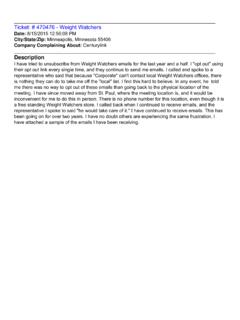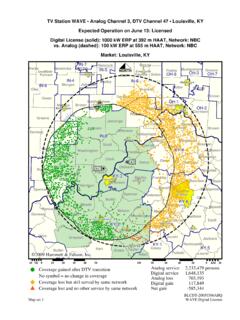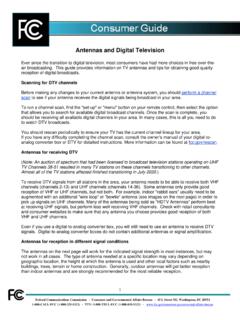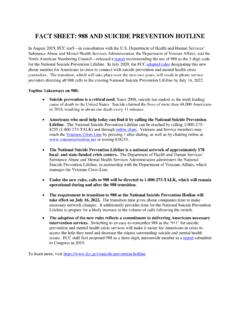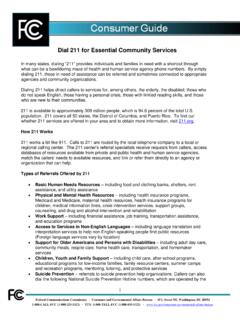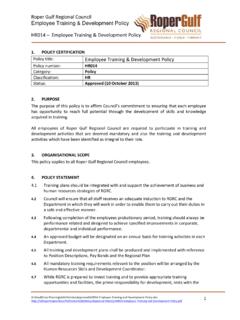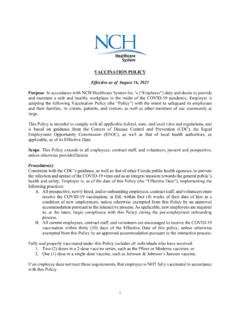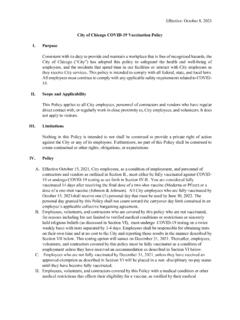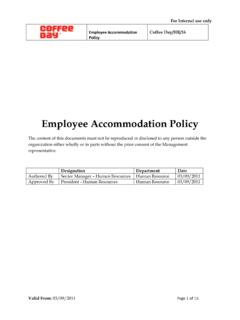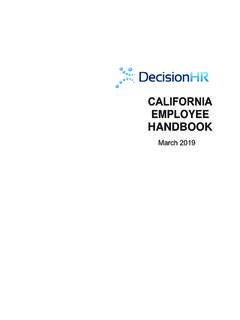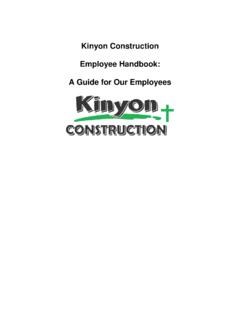Transcription of REASONABLE ACCOMMODATION POLICY AND PROCEDURES
1 REASONABLE ACCOMMODATION POLICY AND PROCEDURES Table of Contents Part I General Provisions .. 1 A. Purpose .. 1 B. POLICY .. 1 C. Coverage .. 1 D. Distribution .. 1 E. Responsibilities .. 1 F. Definitions .. 5 Part II REASONABLE ACCOMMODATION PROCEDURES for FCC Employees .. 6 A. Requests for REASONABLE ACCOMMODATION .. 6 B. Processing a Request for REASONABLE ACCOMMODATION .. 7 C. The Interactive Process .. 7 D. Medical Documentation .. 9 E. Confidentiality Requirements .. 10 F. Time Limits .. 11 G. PROCEDURES for Providing Personal Assistance Services (PAS) for Employees with Targeted Disabilities .. 12 H. Resolution of Requests for REASONABLE ACCOMMODATION .. 12 I. Reconsideration of a Denial of a Request .. 13 Part III REASONABLE ACCOMMODATION PROCEDURES for Applicants for Employment.
2 14 A. Request for REASONABLE ACCOMMODATION .. 14 B. Decision on REASONABLE ACCOMMODATION Request .. 15 Part IV Reporting Requirements, Information Tracking, and Recordkeeping Systems .. 15 A. Documentation .. 15 ii B. Reports and Assessments .. 16 C. Recordkeeping Systems .. 16 Part V Ensuring Disability Access to Electronic or Information Technology for FCC Employees and Applicants for Employment .. 17 A. Accessibility .. 17 B. Complaint PROCEDURES .. 17 Part VI Authority .. 17 APPENDIX - Additional information and Resources 1 Part I General Provisions A. Purpose This document establishes the Federal Communications Commission s (FCC) POLICY and PROCEDURES for the employment of persons with disabilities. The primary objectives of this POLICY are to ensure equal employment opportunity (EEO) for employees and applicants for employment without regard to disability, define the roles and responsibilities regarding the employment of persons with disabilities, as well as provide PROCEDURES for expanding employment opportunities for people with disabilities and processing requests for REASONABLE ACCOMMODATION .
3 B. POLICY The FCC s POLICY is to ensure that employees and applicants for employment will not be discriminated or retaliated against on the basis of any disability. Accordingly, the FCC takes effective action to recruit, hire, develop and advance employees with disabilities, including targeted disabilities, to the fullest extent possible and ensures that all individuals with disabilities are accorded equal employment opportunities. Further, the FCC is fully committed to making agency facilities accessible, and reasonably accommodating the known physical or mental limitations of individuals by providing an ACCOMMODATION that does not impose an undue hardship on FCC operations. C. Coverage This POLICY applies to all employees or job applicants. FCC employees include all FCC employees, regardless of appointment type (competitive or excepted), career status (temporary, career-conditional, or career), occupation, or work schedule (full-time, part-time, or temporary).
4 D. Distribution This POLICY will be posted on the Office of Workplace Diversity websites on the FCC internet and FCC intranet pages, and made available to all employees and FCC job applicants in written and accessible formats. For additional accessible formats, including all attachments to this POLICY , please contact the Office of Workplace Diversity at . E. Responsibilities 1. The Chairman. The Chairman is responsible for EEO programs at the FCC to include: a. Ensuring that all FCC management officials are held accountable for achieving the objectives of this POLICY and fulfilling EEO requirements to prevent discrimination against employees or applicants based on disability. 2 b. Ensuring that FCC operations adhere to EEO principles in its human capital policies and practices relating to the employment, development, advancement, and treatment of FCC employees or applicants regardless of disability.
5 2. Director, Office of Workplace Diversity. The Director, Office of Workplace Diversity (OWD) develops and implements the FCC s disability anti-discrimination program consistent with the requirements of 29 (c) and other relevant statutory and regulatory provisions. Specific responsibilities include: a. Advising and reporting findings to the Chairman on disability discrimination cases and other matters arising from this POLICY s implementation. b. Providing guidance and advice concerning equality of opportunity for persons with disabilities in all aspects of employment, including information about new requirements and changes in disability laws. c. Proposing, developing, and reviewing FCC policies and PROCEDURES to promote equality of opportunity for individuals with disabilities, including examining agency efforts to provide REASONABLE accommodations and making facilities accessible, and generating reports to track the agency s compliance with disability laws and regulatory requirements.
6 D. Managing the EEO discrimination complaint process, including claims involving denials of requests for REASONABLE ACCOMMODATION . e. Collaborating with the Human Resources Management office (HRM) and the Learning and Development Service Center to ensure regular and appropriate guidance and training are provided to employees and management officials concerning the agency s REASONABLE ACCOMMODATION process and the various hiring programs and other resources available for recruiting, promoting, and retaining persons with disabilities. f. Collaborating with HRM, Recruitment & Staffing Service Center (RSSC) to address barriers that affect recruitment, hiring, retention, and promotion of individuals with disabilities and recommending specific remedies to remove such barriers. 3. The Chief Human Capital Officer (CHCO).
7 The CHCO coordinates the employment of persons with disabilities with OWD and provides human capital advice as it relates to disability employment. Specific responsibilities include: a. Reviewing and updating the agency s plan for increasing employment and retention of individuals with disabilities and monitoring implementation of the plan. 3 b. Taking affirmative employment actions to promote equality of opportunity for individuals with disabilities and targeted disabilities in all stages of employment including recruitment, hiring, placement, training, and career development ( , providing written material in an accessible format). c. Regularly reviewing agency PROCEDURES to ensure that vacancy announcements and hiring and promotion PROCEDURES include information describing how applicants may submit REASONABLE ACCOMMODATION requests.
8 D. Collaborating with the Director, OWD to ensure that guidance and training are provided to agency personnel regarding all matters under this POLICY . 4. REASONABLE ACCOMMODATION Coordinator (RAC). The RAC provides assistance and guidance on the requirements of this POLICY and ensures that management officials and employees are informed of any new requirements and changes in disability laws. Specific responsibilities include: a. Implementing the FCC s REASONABLE ACCOMMODATION PROCEDURES consistent with this POLICY , governing laws and regulations, executive orders, and EEOC directives. b. Providing guidance and delivering training to employees and management officials concerning the agency s REASONABLE ACCOMMODATION PROCEDURES . c. Establishing effective tracking systems to monitor the processing of REASONABLE ACCOMMODATION requests.
9 D. Regularly reviewing and analyzing the FCC s REASONABLE ACCOMMODATION process. e. Managing the FCC s REASONABLE ACCOMMODATION PROCEDURES , to include providing necessary guidance and technical assistance to managers, supervisors, employees, and applicants regarding requests for REASONABLE ACCOMMODATION , and consulting with other agency offices and officials as necessary. f. Assisting FCC management officials in evaluating accommodations that have been provided to ensure their continued effectiveness. g. Requesting and reviewing medical information if an impairment or need for ACCOMMODATION is not obvious to include having medical information reviewed by an external Medical Review Official (MRO) of the agency s choosing and at the agency s request and expense. h. Serving as the deciding official for REASONABLE ACCOMMODATION requests from applicants.
10 4 i. Participating in annual training relating to disability laws and regulations, to include training related to the provision of REASONABLE accommodations. 5. Supervisors and/or Managers. All supervisors and managers are responsible for ensuring equality of opportunity in the workplace for individuals with disabilities. Specific responsibilities relating to REASONABLE ACCOMMODATION and nondiscrimination based on disability include: a. Consulting with the RAC in connection with all requests for REASONABLE ACCOMMODATION . b. Consulting with the RAC in assessing REASONABLE ACCOMMODATION options for an employee whose limitations or need for ACCOMMODATION is obvious, even when the employee has not requested an ACCOMMODATION . c. Receiving and promptly responding to employee requests for ACCOMMODATION , including contacting the RAC when a request for ACCOMMODATION is initially received, engaging in the interactive process, identifying essential job functions and potential accommodations, and maintaining the confidentiality of ACCOMMODATION information.

